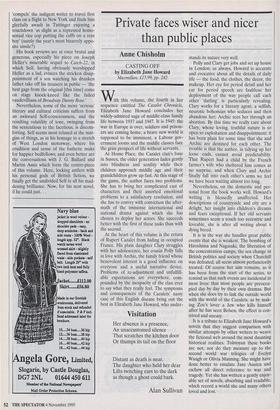Private faces wiser and nicer than public places
Anne Chisholm
CASTING OFF by Elizabeth Jane Howard Macmillan, £15.99, pp. 242 With this volume, the fourth in her sequence entitled The Cazalet Chronicle, Elizabeth Jane Howard concludes her widely-admired saga of middle-class family life between 1937 and 1947. It is 1945: the war in Europe is over, soldiers and prison- ers are coming home, a brave new world is supposed to be imminent, a Labour gov- ernment looms and the middle classes face the grim prospect of life without servants.
At Home Place, the Cazalet clan's base in Sussex, the older generation fades gently into blindness and senility while their children approach middle age and their grandchildren grow up fast. At this stage of the game, the author faces two problems. She has to bring her complicated cast of characters and their assorted emotional problems to a satisfactory resolution, and she has to convey with conviction the after- math of the immense international and national drama against which she has chosen to deploy her actors. She succeeds better with the first of these tasks than with the second.
At the heart of this volume is the return of Rupert Cazalet from hiding in occupied France. His plain daughter Clary struggles with her adolescence, her cousin Polly falls in love with Archie, the family friend whose benevolent interest is a good influence on everyone and a useful narrative device. Problems of re-adjustment and unfulfill- able expectations are everywhere, com- pounded by the incapacity of the clan ever to say what they really feel. The symptoms and consequences of the Cazalets' nasty case of this English disease bring out the best in Elizabeth Jane Howard, who under- stands its nature very well.
Polly and Clary get jobs and set up house in London; as always, Howard is accurate and evocative about all the details of daily life — the food, the clothes, the decor, the makeup. Her eye for period detail and her ear for period speech are faultless: her deployment of the way people call each other 'darling' is particularly revealing. Clary works for a literary agent, a selfish, neurotic bohemian who seduces and then abandons her; Archie sees her through an abortion. By this time we really care about Clary, whose loving, truthful nature is so open to exploitation and disappointment: it has been plain for some time that she and Archie are destined for each other. The trouble is that the author, in tidying up her loose ends, cannot avoid predictability. That Rupert had a child by the French farmer's wife who sheltered him comes as no surprise, and when Clary and Archie finally fall into each other's arms we feel we have been waiting almost too long.
Nevertheless, on the domestic and per- sonal front the book works well. Howard's writing is blessedly unaffected. Her descriptions of countryside and city are a delight, her insight into children's dreams and fears exceptional. If her old servants sometimes seem a touch too eccentric and loveable, she is after all writing about a dying breed.
It is in the way she handles great public events that she is weakest. The bombing of Hiroshima and Nagasaki, the liberation of the concentration camps, the sea change in British politics and society when Churchill was defeated, all seem almost perfunctorily treated. Of course her aim remains, as it has been from the start of the series, to remind us that such events are incidental in most lives: that most people are preoccu- pied day by day by their own dramas. But when she does try to link the outside world with the world of the Cazalets, as by mak- ing Zoe's lover a Jew who kills himself after he has seen Belsen, the effect is con- trived and uneasy.
It is a tribute to Elizabeth Jane Howard's novels that they suggest comparison with similar attempts by other writers to weave the fictional web around the most daunting historical realities. Tolstoyan these books are not, nor do they measure up to the second world war trilogies of Evelyn Waugh or Olivia Manning. She might have done better to emulate Jane Austen and eschew all direct reference to war and tragedy. Yet she has written a gently enjoy- able set of novels, absorbing and readable, which record a world she and many others loved and lost.










































































 Previous page
Previous page